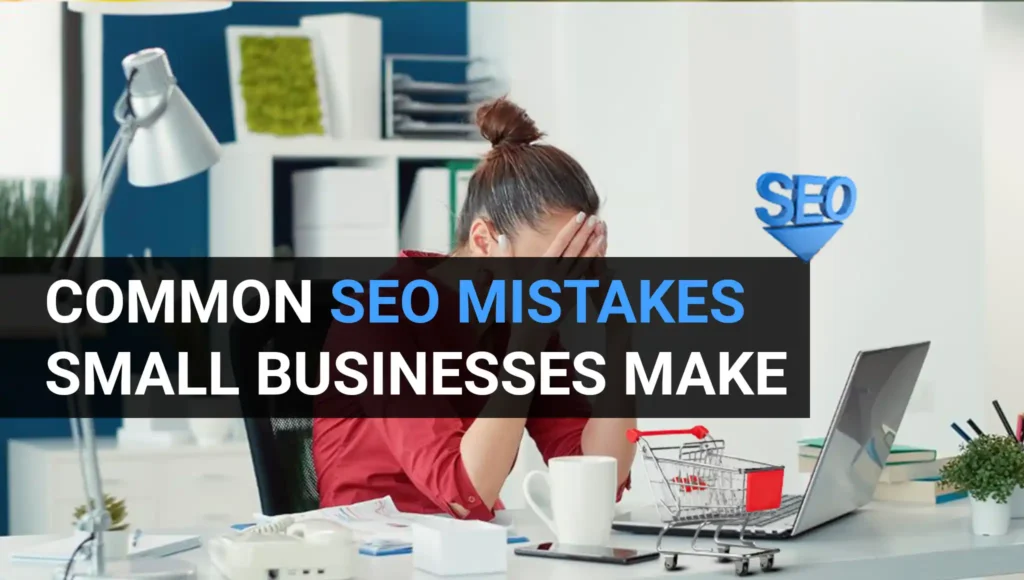For small businesses, SEO (Search Engine Optimization) is one of the critical things on which they should spend time building an online presence. Most small business owners, however, unknowingly stumble into traps that prevent them from success. Let us discuss some of the common SEO mistakes made by small businesses and what you can do to avoid those mistakes.
Ignoring Keyword Research
When small business owners attempt SEO, one of the biggest mistakes they usually make is failing to do the proper keyword research. The basic building blocks of any successful SEO approach are keywords. Without knowing what potential customers are looking for, it’s hard to draw in the right people.
If small businesses target broad terms or keywords that are irrelevant, they have poor search engine results. To give an example, if a local bakery sees a keyword like “delicious cake” and optimizes to that, instead of “bakery near me,” they are likely to lose out on traffic locally. You can use tools like Google Keyword Planner or SEMrush to find high-value, low-competition keywords that are relevant to your business niche.
Another frequent mistake is overstuffing content with keywords, which can result in penalties from search engines. So, while keywords matter, they need to be introduced in a way that feels appropriate and keeps the content legible and appealing.
For example, one can also combine primary keywords with secondary keywords to help businesses get better results, such as “common SEO mistakes small businesses make” with secondary ones like “enterprise SEO mistakes” and “SME and SEO.”
This is where keyword research comes in; researching these keywords not only brings the right people to your business, but it also allows your small business to compete with larger businesses.
Overlooking Technical SEO
Technical SEO has a big impact on how your website will be indexed and ranked. Sadly, this domain tends to be neglected by many small businesses, owing to its complex nature.
Common SEO mistakes of small businesses: page speed, broken links, or poor mobile responsiveness. Search engines consider technical factors like site speed, responsiveness, and usability, and websites lagging behind these standards tend to rank lower in searches. Ex: One great way to help the user is to work on loading time.
Tools such as Google Search Console or GTmetrix can reveal technical issues you may be facing, so investing in them can yield positive results. Another important step is to make sure that the design is mobile-friendly since mobile traffic still leads web traffic around the world.
If you have the resources, small business owners should also consider calling in professional help for technical SEO.
Technical SEO helps businesses ensure their websites are designed in a way that is friendly for both users and search engines.
Producing Low-Quality Content
Content is at the core of SEO, and many small businesses face a challenge to create content that is relatable to their audience. Thinning down, generic, or poorly written stuff is an error that may injure a website’s reliability.
Search engines favor content that is valuable to users. An example would be a fitness studio that writes in-depth guides on several “common fitness mistakes,” rather than just promoting its own services. Using keywords such as “common SEO mistakes” as part of the content helps build rankings and trust within the audience.
Another common challenge facing small businesses is duplicate content. It Can Get You Penalized Without Contents Copyright Act: Copy-Pasting Content From Competitors Can Bring a Rain of Dope @judge Coming up with original content is important; small businesses need to focus on producing materials that showcase their knowledge and fit their brand’s voice.
Invoking quality content takes time, but it renders rewards when it comes to establishing authority and trustworthiness with both users and search engines alike.
Mixing up local SEO opportunities
One of the highest-converting methods of engaging nearby customers, local SEO is often neglected by small businesses. Not optimizing for local search queries is a lost opportunity.
Companies that don’t manage their Google Business Profiles (originally known as Google My Business) or ensure that information like submission information and hours are correct are giving up prospective customers. A coffee shop that does not rank in local searches on terms such as “coffee near me” misses out on huge amounts of traffic.
SMB and SEO services in [City] can also improve visibility. Another important factor of local SEO is reviews and ratings. Boosting happy customers’ reviews potentially affects ranking and credibility.
These strategies can help small businesses outrank their larger competitors in local searches.
Failing to Monitor Analytics
Are you aware that although it is important for SEO success, many small businesses do not keep track of their performance metrics? Using assumptions alone as opposed to insight can lead your strategy astray.
Understanding how analytics tools such as Google Analytics or Ahrefs work, which provide information on site performance, user activity, and event tracking, as well as ranking, which instantaneously connects insights with keywords. For example, analyzing high-traffic pages or high-bounce-rate pages can help identify areas that need improvement.
It also helps small business owners figure out what works and what doesn’t with regular checks. Finding and Allocating Resources through Data If a blog post is performing well for “mistakes small business owners make when using SEO,” then shift focus to try to create content that complements it.
Analytics will empower the company to make data-driven decisions and refine the company’s search engine optimization tactics over time.
Neglecting Link Building
Link building is still crucial for SEO departments, but many small businesses overlook this or fail to grasp the concept. Links from credible sites tell search engines that a site is credible and trustworthy.
Most small businesses do not spend money on outreach or partnerships that would lead to high-quality backlinks. Instead, many are left to buy junk links, which often leads to penalties. A more effective way is to create valuable content that other people will want to share or link to naturally. A comprehensive article on “common SEO mistakes small businesses make,” for example, could earn links from industry blogs or forums.
Internal linking is another one that is just as important but often ignored. Interlinking relevant pages throughout a domain helps search engine crawlers to easily recognize the structure of a website, which in turn helps users with seamless exploration. For instance, if someone links a blog post on “enterprise SEO mistakes” to a related service page, it adds value both for the users as well as the SEO.
While these efforts take time, they pay off over the long term by enhancing domain authority and search engine rankings through strategic link-building efforts.
Overemphasis on Quick Results
SEO is a long-term game, so small businesses expect instant results. Yet this impatience is often what causes us to abandon all SEO effort or engage in less than ethical practices.
While these black-hat techniques — including keyword stuffing, cloaking, or spammy link schemes — can deliver short-term revenue, the penalties in the long run are damaging. For instance, improper practices of a site might result in its de-indexing, erasing the months of efforts.
Businesses need to move away from chasing quick results and instead invest in sustainable growth. Doing proper keyword research, focusing on content and technical parts, lead to solid results over time. Realizing that SEO is a marathon and not a sprint, we can have realistic expectations.
With a long-term view in mind, small business owners can ensure that their SEO efforts pay dividends for years to come.
How to Improve Local SEO Ranking: Avoid These Mistakes
Small businesses often make costly errors when aiming to improve their local SEO ranking. Fixing these can boost visibility and attract more customers.
Ignoring Google My Business Optimization
Many businesses neglect Google My Business (GMB), hurting their local presence. Ensure your listing is complete, accurate, and regularly updated.
Overlooking Local Keyword Optimization
Using broad keywords instead of location-based ones is a common local SEO mistake. Optimize content with city or region-specific terms.
Neglecting Online Reviews
Not managing customer reviews is a significant small business SEO mistake. Inspire reviews and respond to both positive and negative feedback.
Poor Website Structure and Slow Speed
Common website SEO issues for small businesses include slow loading times and confusing navigation. To improve rankings, optimize images, and improve site structure.
Inconsistent NAP Information
A mismatched Name, Address, and Phone Number (NAP) confuse search engines. Avoid this common local SEO mistake by keeping details consistent across all listings.
Lack of Mobile Optimization
Many users search on mobile devices. A non-mobile-friendly site is a big SEO mistake for small businesses. Use mobile-friendly design to improve user experience.
Ignoring Backlinks from Local Sources
Strong local backlinks improve credibility. A mistake in SEO is ignoring partnerships and local directories that enhance authority.
Poor Content and Keyword Stuffing
Low-quality content and keyword stuffing hurt rankings. To avoid common SEO mistakes in digital content production, create valuable, well-optimized posts.
Lack of Tracking and Reporting
Without tracking performance, you can’t improve. Enterprise SEO reporting mistakes include ignoring key metrics like local search rankings and click-through rates.
Overlooking Paid Ads Strategy
Many businesses make common mistakes in local paid advertising strategies by targeting the wrong audience or mismanaging budgets. Optimize ad settings for better ROI.
Fixing these common local SEO mistakes helps improve local SEO ranking and bring more organic traffic to your business.
Conclusion
When you build a strong online presence, avoid common SEO mistakes small businesses make. Every step of the way, from prioritizing keyword research through optimizing for technical search and local opportunities, is vital. These need to be addressed with best practices in mind so small businesses can compete in the digital landscape. This would significantly impact how tech companies operate around the world.
FAQ
What are some common SEO mistakes?
Common SEO mistakes include ignoring proper keyword research, creating low-quality or duplicate content, and neglecting technical aspects like site speed, mobile optimization, and broken links. Many businesses also overlook the importance of acquiring quality backlinks and fail to track performance through tools like Google Analytics, missing opportunities to refine their strategies.
What is the main mistake of SEO that companies make?
The main mistake companies make in SEO is focusing too much on achieving high rankings without prioritizing user experience and conversion optimization. While securing a top spot in search results is valuable, it doesn’t guarantee success if visitors leave the site quickly due to poor design, irrelevant content, or slow loading times. A holistic approach that balances rankings with engagement and usability leads to better long-term results.
Does SEO really work for small businesses?
SEO is an effective and affordable way for small businesses to increase their visibility and attract organic traffic. By targeting niche keywords and optimizing for local searches, small businesses can compete with larger companies and reach potential customers more easily. A well-planned SEO strategy helps establish credibility, improve brand awareness, and drive long-term growth without relying heavily on paid advertising.
What is the biggest mistake small businesses make?
The biggest mistake small businesses make is neglecting local SEO. Many fail to optimize their Google My Business profile, gather customer reviews, or include location-specific keywords in their content. This limits their visibility in local search results, making it harder for nearby customers to discover their services. Prioritizing local SEO can significantly boost traffic and lead generation for small businesses.
Which SEO technique should be avoided?
Businesses should avoid black hat SEO techniques, including keyword stuffing, cloaking, and purchasing backlinks. These practices may seem like shortcuts to improve rankings, but they violate search engine guidelines and can result in severe penalties, causing a drop in visibility or even removal from search results. Focusing on ethical, white hat SEO strategies ensures sustainable growth and long-term success.


